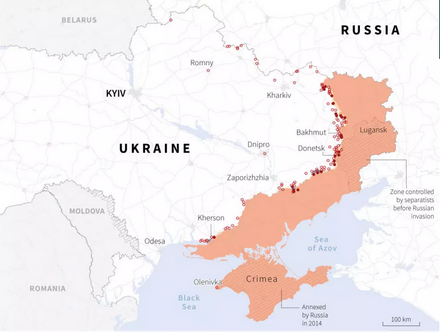You are here
Crimea, territory at heart of US-Ukraine tensions
By AFP - Apr 24,2025 - Last updated at Apr 24,2025

KYIV, Ukraine — Crimea, the focus of fresh tensions between US President Donald Trump and his Ukranian counterpart VolodymyrZelensky, was illegally annexed by Russia in 2014 in the first act of the countries' ongoing war.
According to US media reports, Washington's plan to end the full-scale Russian invasion of Ukraine, launched in February 2022, includes the US recognizing Russian control of the peninsula -- a prospect unacceptable to Kyiv.
The annexation of Crimea in March 2014 sparked the first wave of Western sanctions against Russia, and caused a surge in tensions in Moscow's relations with Ukraine as well as with the United States and Europe.
Here are some facts about the territory.
Pre- and post-Soviet history
The Black Sea peninsula has a rugged landscape and beautiful beaches as well as ancient remains and architecture reflecting a diverse history of settlers including Greeks, Romans, Tatars and Turks.
Its main sea resort, Yalta, hosted the conference of British, Soviet and US leaders that divided up Europe at the end of World War II. Its warm temperate climate makes it also a wine-growing region.
Soviet leader Nikita Khrushchev, himself from Ukraine, transferred Crimea from Russia to Ukraine in 1954 as a "gift" to commemorate 300 years of a treaty between the Ukrainian Cossacks and the Russian tsardom.
But this was largely a symbolic move since Ukraine and Russia were both republics of the USSR.
A year after the collapse of the Soviet Union in 1991 Kyiv gave Crimea the status of an autonomous republic in a bid to prevent separatist tendencies among its mainly Russian-speaking population.
After years of disputes, Russia gained the right to station its naval fleet in the Crimean port of Sevastopol, extending its sphere of operations in the Black Sea and beyond, towards the Mediterranean and the Middle East.
Despite this agreement, the Crimean issue poisoned relations between Moscow and Kyiv for years. Some regional officials regularly challenged Ukraine's right to be in charge there.
2014 annexation
After pro-Western authorities came to power in Ukraine following the Maidanrevolution in February 2014, clashes erupted in Crimea between pro-Moscow and pro-Kyiv supporters.
A heavily armed pro-Russian commando unit seized the parliament building, supported by thousands of uniformed personnel deployed across the peninsula.
Those soldiers, in balaclavas and without military insignia, quickly took control of public buildings and besieged Ukrainian military bases. President Vladimir Putin only later acknowledged that they were Russian soldiers.
On March 16 Russia held a hastily-organised referendum in Crimea. It said that 97 per cent voted "yes" to Crimea becoming part of Russia.
The vote was declared null and void by Kyiv and the West, which denounced as illegal its annexation, formalised in a treaty signed by Putin.
The treaty has still not been recognised as valid except by a handful of countries including Afghanistan, Cuba, North Korea, Kyrgyzstan, Syria and Zimbabwe. China has not recognised the annexation, nor have some Moscow-allied countries such as Belarus and Kazakhstan.
The European Union, the United States, Britain and Canada adopted initial sanctions against Russia, in the form of asset freezes, embargoes targeting specific sectors and a ban on investments in Crimea.
Crimea since 2014
Crimea, which covered 4.5 per cent of Ukraine's territory, was integrated into Russia in 2014, becoming an autonomous republic with its own government and institutions subordinate to Moscow.
The city of Sevastopol was granted a special separate status, like the Russian capital and the north-westerncity of Saint Petersburg.
The ruble replaced the Ukrainian hryvnia currency and the peninsula switched to Moscow time, while Russian companies, including some banks and telephone operators, set up branches there.
Western and Ukrainian tourism to the region slumped, replaced by hordes of Russian and Belarusian holidaymakers.
Local authorities are massively distributing Russian passports to the population, while the Crimean Tatars, a Muslim minority who voted overwhelmingly against the annexation, are subject to repression.
In 2016, the Mejlis, the representative body of the Crimean Tatar community, was declared "extremist", sparking a wave of arrests and forced exile.
Since 2018, the peninsula has been linked to mainland Russia by the Kerch road bridge, 19 kilometres (12 miles) long. It has been struck and damaged by Ukrainian forces numerous times.
















